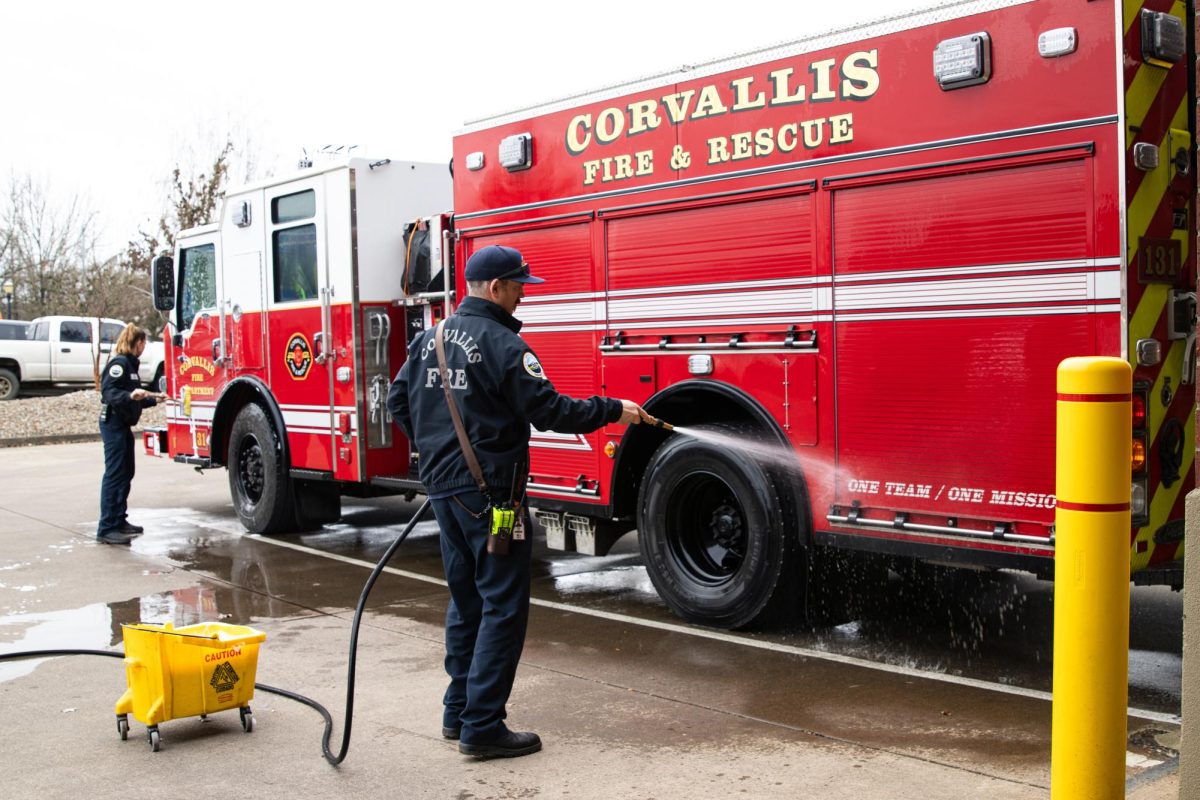ASOSU crosses $500 threshold for student fees
A breakdown of funds to each student fee funded unit in the 2023-2024 budget.
February 7, 2023
Student fees may increase by 4.98% to $505.46 each term for the fiscal year of 2024, after the Student Fee Committee held final deliberations for budget requests on Feb. 2.
Joe Page, the student fee committee chair, gavelled the public meeting to order at 5:04 p.m. in the Memorial Union Lounge, which saw eight student fee funded entities – Student Experiences & Engagement, Recreational Sports, Family Resource Center, Performing Arts, Memorial Union, Intercollegiate Athletics, Basic Needs Center, Associated Students of OSU – request dollar amounts for various programs and positions.
A portion of these student fees will be paid back to student workers as all entities, besides ASOSU, requested and were approved a 2.75% Cost-of-Living Adjustment increase – which will be reflected in higher wages for student employees under these units.
Instead of asking for a decision package to increase COLA, ASOSU will support the COLA through in unit payroll cuts as the unit moves from a bicameral legislature to a unicameral legislature.
Though every proposal was ultimately voted through, this was not without pushback from SFC members and members of the public for certain requests.
Student Experiences & Engagement was approved an operating budget of $100.16 per student per term and so were its decision packages, which were the 2.75% COLA increase and a request to fund a Student Organizations Program Coordinator.
The requested operating budget of $117.21 and the COLA for Rec Sports – plus an additional $150,000 for building reserves, which amounts to $2.30 per student per term, and will be used for building repairs and future projects such as locker room renovations, according to Jared Pratt, the recreational sports SFC representative – was approved.
In addition, a third decision package requesting $1.15 per student per term was approved for additional employment opportunities in the fitness, wellness and maintenance areas. In particular, part of this funding will scale-up the Find Your Fit program, which allows students to familiarize themselves with Rec Sports facilities through a student worker fitness partner.
“(The Find Your Fit Program) has been shown to be really positive,” Pratt said. “Students love it and have loved the ability to use it… we want to continue this program and not have it be something that’s short-staffed.”
The Family Resource Center operational budget request of $16.40 per student per term, the COLA, $1.25 to fund an Administrative Program Assistant and $1.45 for custodial services the Memorial Union provides FRC facilities were all approved by the SFC.
Although the Performing Arts operational budget of $7.70 per student per term, the COLA, $0.07 for band logistics and moving, $0.34 for funding for Bard in the Quad were all approved without hesitation, a request for $0.27 for vocal studies and lyric workshop sparked debate about funding an academic program that can be taken for credit.
Sierra Young, the ASOSU Vice President, attended the SFC conference as an impassioned performing arts student, pointing out the vote for Rec Sports was carried out much quicker than the vote for Performing Arts.
“Just because there’s no ball being thrown, I don’t see that there’s any less value,” Young said during a public comment to the SFC.
After a 6-6-1 tie vote, the SFC approved the proposal upon a revote.
“I’m a saxophone performance minor… it’s always discouraging to hear such scrutiny over Performing Arts,” Young said. “While I understood the pushback… it seemed like a bit too much for 27 cents.”
The Memorial Union operational budget request of $86.92 per student per term, the COLA, $1.32 to fund an Administrative Specialist and $0.91 to fund a Project Manager were all approved by the SFC.
In addition, the reallocation of $1 million from a planned removal of the ADA barrier on the Mezzanine level of the MU – the total cost is estimated to be $7 million, which the MU does not have currently – to an upgrade of the MU Lanes and Games, which will include a gender-inclusive bathroom, was approved by the SFC.
The requested operating budget for Intercollegiate Athletics, $42.71 per student per term, and the COLA was approved by the SFC.
Perhaps the most tense debate stemmed from whether or not a student fee of $1.66 should cover a position for an additional sports psychologist.
Members of the public expressed concerns about equity, and how the sports psychologist would only be available to student athletes while being funded by the entire student body.
“Having experience being a student athlete, there is a lot of unique pressures that come along with that,” Mari Friedman, a senior track and field athlete said in a public comment during the conference.
The proposal was approved, but some students present were not happy with the decision.
“In an ideal world, it’d be an easy yes, but I think it’s an unfair ask of the general student body,” said Emily Erving, a student a part of ASOSU House of Representatives and audience member during the SFC deliberation. “It’s not something that is accessible to all students.”
The Basic Needs Center operational budget request of $20.82 and the COLA was approved by the SFC.
The ASOSU operational budget request of $32.36 was approved, but no COLA was requested by ASOSU due to their planned payroll cut next academic year.
Page said that the meeting went smoothly, in comparison to past SFC deliberations.
“Everything that we recommended last night was with the best interest of students in mind,” Page said. “Students are going to feel positive impacts from that.”
Though this is the first time that the total student fees will be over $500 per term, Page said this was bound to happen due to inflation and the addition of programs for students.
“This is the first time we are crossing that $500 threshold, but the actual percentage we are increasing the (student fee) by is lower than it has been the past couple of years,” Page said. “If it wasn’t this year, then it’s next year.”
The next step for approval of these SFC decisions by the ASOSU Congress will take place on Feb. 15 and 22 at 6 p.m. in the MU Horizon Room. These meetings are open to the public.


















































































![Newspaper clipping from February 25, 1970 in the Daily Barometer showing an article written by Bob Allen, past Barometer Editor. This article was written to spotlight both the student body’s lack of participation with student government at the time in conjunction with their class representatives response. [It’s important to note ASOSU was not structured identically to today’s standards, likely having a president on behalf of each class work together as one entity as opposed to one president representing all classes.]](https://dailybaro.orangemedianetwork.com/wp-content/uploads/2025/03/Screenshot-2025-03-12-1.00.42-PM-e1741811160853.png)
























